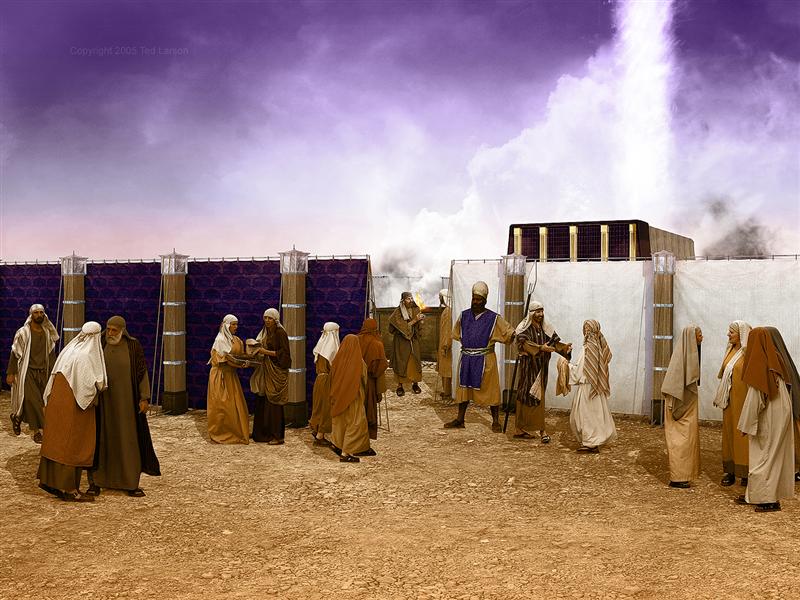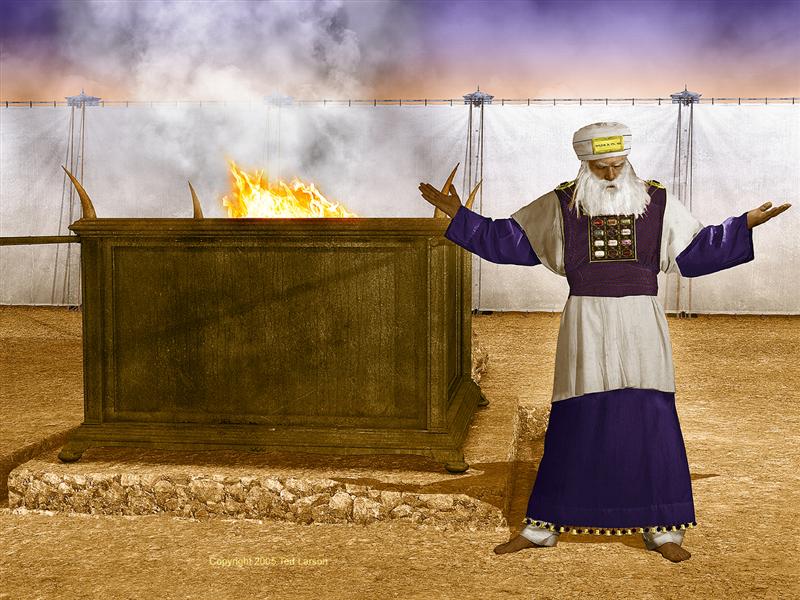|
ויקרא- "And (He) Called" |
||
|
 |
|
Leviticus 1:1
Then the LORD called to Moses and spoke to him from the tent of meeting, saying,
| << Previous (Pekudei) | Next (Tzav) >> |
The Hebrew Words
Kahrah is a primitive root which means "to call out to". Kahrah (Strong's #7121) is used 739 times in 685 verses in the Tanakh.
Kahrah is the root of other Hebrew words:
- ane-hakkoray (Enhakkore) ["Fountain of one calling"] (Strong's #5875)
- kerah (Chaldee) ["cry"] (Strong's #7123)
- kahree ["famous"] (Strong's #7148)
- kereah ["proclamation" or "preacher"] (Strong's #7150
First use in Scripture
The first time kahrah is used in Scripture is in Genesis 1:5.
Genesis 1:5
G-d called, the light day, and the darkness He called night. And there was evening and there was morning, one day.
Last use in Scripture
The last time kahrah is used in Scripture is in Malachi 1:5.
Malachi 1:5
Though Edom says, "We have been beaten down, but we will return and build up the ruins"; thus says the LORD of hosts, "They may build, but I will tear down; and men will call them the wicked territory, and the people toward whom the LORD is indignant forever."
Parashah Outline
- The Laws of Burnt Offerings - Leviticus 1:1
- The Laws of Grain Offerings - Leviticus 2:1
- The Laws of Peace Offerings - Leviticus 3:1
- The Laws of Sin Offerings - Leviticus 4:1
- The Laws of Guilt Offerings - Leviticus 5:1
- The Guilt Offering - Leviticus 6:1
Portraits of Messiah
Leviticus chapter 3 provides instructions regarding the peace offering (shelemim). In Romans 5:1, Sha'ul says "we have peace with G-d through our Lord Yeshua Ha Mashiach". The peace offering then is a picture of Messiah.
Verse by Verse Notes
Chapter 1
Leviticus 1:2
"Offering" in this an many other passages of the Torah is the Hebrew word קרבּן ( korban - plural korbanot). Unlike the pagan or heathen understanding of this term the Hebrew word has no sense of appeasement or penalty. Korban comes from a Hebrew root word which means "to bring near". When we gather our children to ourselves to hug them or correct them we are "bringing them near". It is same sense of "bringing near" that is infused into the word korban.
The instruction on korbanot found in the beginning of the book of Leviticus (vayikra in Hebrew) comes immediately after the construction of the tabernacle and G-d's presence filled it such that " Moshe was not able to enter the tent of meeting". Moshe was able to stand in G-d's presence on Mt. Sinai and he cannot enter into G-d's presence in the tabernacle. There is something special about G-d's presence in the tabernacle such that it requires a special mechanism for anyone to enter into His presence. G-d provides instructions about that special mechanism here in the beginning of the book of Vayikra.
Leviticus 1:9
The entrails and the legs of the korban are to be washed with water. What is the significance of this? It may be to cleanse fecal matter from the legs and digestive tract so it is not offered and/or burned up on the altar. The symbolic significance as it relates to Messiah is (at present) a mystery.
The olah [burnt offering] is described as a soothing aroma to G-d.
Chapter 2
Leviticus 2:3
When a grain offering is brought a portion has oil and frankincense poured on it which is then offered up in smoke on the altar. The remainder of the grain offering belongs to Aharon and his sons. Scripture calls this remainder portion "most holy" (kodesh kadashim). It is holy in that it has been set apart for G-d. It is most holy in that a portion of the offering which has been set apart for Him G-d has set apart for Aharon and his sons.
Chapter 3
Leviticus 3:1
"Now if his offering is a sacrifice of peace offerings..." Using our new vocabulary term korban we can view this as "Now if the korban is a slaughtered peace offering...". The word translated "peace offering" here is shelem which is related to the word shalom [peace].
In the remainder of the chapter we see these common items:
- The offering is "before the Lord". Literally is says "in the face [panim] of the LORD".
- The person bringing the offering is to lay his hand upon the head of the animal.
- The person bringing the offering is to slay it in the courtyard in front [panim again] of the "tent of meeting".
- Aharon's sons shall sprinkle the blood of the animal around on the altar.
- The following parts of the animal are to be completely burned up as a fire offering on the brazen altar by Aharon's sons:
- The fat that covers the entrails [the epiploon/omentum for you medical folks]: the double membrane that acts like a sack holding the intestines together.
- The fat that is on the entrails
- The two kidneys and that fat that is on them
- The lobe of the liver (which shall be removed with the kidneys)
- The animal is to be without defect
Leviticus 3:2
"He shall lay his hand on the head of his offering". This is the Hebraic picture of imparting authority. A teacher would lay his hands upon a student's head when the student was ready to go out and speak on behalf of the teacher. The student would go forth in place of the teacher. So, too, we see those bringing a peace offering lay their hands upon its head as if to impart authority to the animal for it to go forth in their stead.
Leviticus 3:9
There are a three types of korbanot described in this chapter: male or female cattle, male or female sheep, or mail or female goats. Verse 9 points out the only significant difference between how the three are described. For sheep "the entire fat tail which he shall remove close to the backbone" is an additional instruction.
Chapter 4
This chapter provides instruction for the offering to be brought in the even of unintentional sin.
Leviticus 4:1-12
The instruction here for the unintentional sin offering pertains to the anointed kohen [priest]. If the kohen sins so as to bring guilt on the people then he is to offer a bull without defect. The phrasing implies that the unintentional sin will be brought to his attention and he should bring the offering.
Leviticus 4:13-21
This passage pertains to the unintentional sin of the whole congregation of Israel. If the whole congregation sins then the elders are to offer a bull without defect. The wording here is explicit that when the sin becomes known they are to bring the offering. G-d will make the sin known.
Leviticus 4:22-26
This passage relates to a leader of Israel who sins unintentionally. If a leader sins then he is to offer a bull without defect. The wording here is conditional noting that if his sin is made known then he is to bring the offering.
Leviticus 4:27-35
The instruction here for the unintentional sin offering pertains to one of the common people. If a common person sins unintentionally then he is to offer a female goat without defect. This is different from the other animals that are commanded possibly because a female goat would be much less expensive than a bull thus providing a lighter burden upon the commoner. The wording here is conditional noting that if his sin is made known then he is to bring the offering.
Chapter 5
Leviticus 5:1
This verse speaks of the sin a person commits after he heard "a public adjuration to testify when he is a witness" to a matter. In the King James this is referred to as the "voice of swearing". If a person knows of a matter and hears a call to testify in a matter he commits a sin if he does not speak what he knows.
Yeshua stood silent before his accusers in the mock Sanhedrin trial (Matthew 26:63) until the high priest stands as says to Yeshua "I adjure You by the living G-d, that You tell us whether You are the Mashiach, the Son of G-d". Since Yeshua clearly knew about this matter and He heard "a public adjuration to testify" if He had not spoken at that point He would have sinned. It is at this point that Yeshua speaks and He avoided sinning in this matter.
Other Observations
